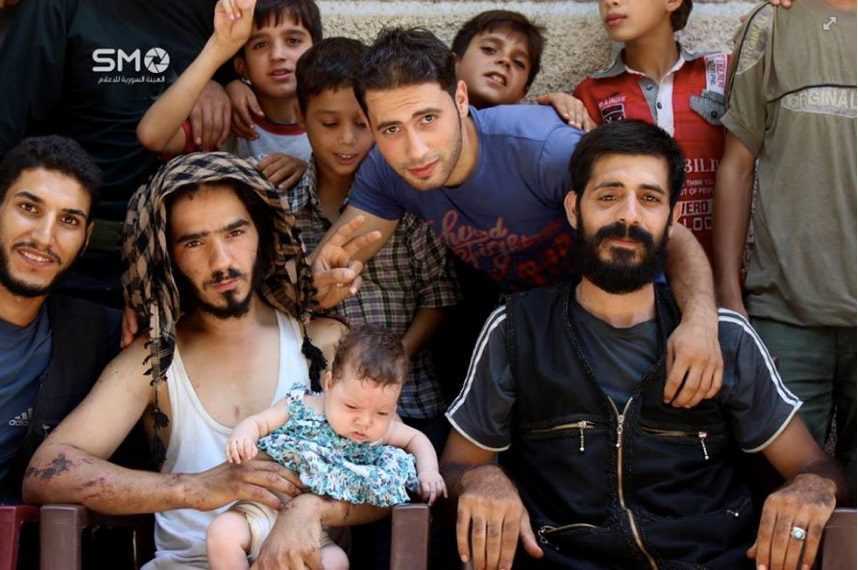Under regime fire, Ghouta’s Civil Defense forces struggle
Mohammed Rihan, left, holding a baby, shows up at his […]
19 August 2015

Missing for three days and believed dead under the rubble of a collapsed building, Mohammed Rihan, seen above, wandered into his own wake at his Harasta home on Wednesday.
Rihan is one of dozens of civilian victims of this month’s regime air raids on East Ghouta. In the case of Rihan’s home town, regime warplanes struck the Damascus suburb of Harasta, 8.4km northeast of the city’s center, following a rebel assault on the nearby regime Military Vehicle Administration building over the weekend.
Each explosion leaves far more dead, wounded and trapped under the rubble of collapsed buildings than the beleaguered Civil Defense Units can serve.
“In East Ghouta, and especially Arbeen, Madeira and Hamouriya, we have no way of covering every air strike with our limited means, to say nothing of neighborhoods under particularly heavy bombardment which in turn threatens the lives of our rescue teams,” Anas a-Shami, a spokesman for East Ghouta’s Civil Defense told Syria Direct on Wednesday.
“Our first responders lack basic equipment, medical devices, vehicles and fuel, all in part due to dwindling local supplies and soaring prices,” a-Shami said.
The effect of a diminished Civil Defense on the local population is immediate–simply put, a-Shami says, more people die.
“After the regime’s bombardment of Arbeen just a few days ago, we pulled two girls, both alive from under the rubble,” said a-Shami.
“But we know there was another, a third girl, whom we never found, and another body we pulled out from the building wreckage after 108 hours–the more we wait, the more likely it is that we find a body, not a survivor,” he said.
Aside from a shortage of men, vehicles and fuel, Ghouta’s Civil Defense lacks the tools and equipment to quickly remove and dig under and around collapsed buildings.
“We’ve got only the most basic equipment–shovels, picks and car jacks for lifting big blocks of cement–and although we can and do save dozens with these simple means, its slow and difficult work,” Mahmoud Adam, a spokesman with the Damascus countryside Civil Defense, told Syria Direct Wednesday.
The International Humanitarian Food Committee warned on Tuesday of a pending “humanitarian disaster” in Ghouta and surrounding towns and villages, reported pro-opposition El-Dorar on Tuesday.
Photo courtesy of Zaman al-Wasal.







